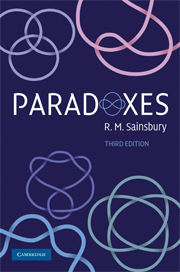Book contents
- Frontmatter
- Contents
- Foreword to third edition
- Introduction
- 1 Zeno's paradoxes: space, time, and motion
- 2 Moral paradoxes
- 3 Vagueness: the paradox of the heap
- 4 Acting rationally
- 5 Believing rationally
- 6 Classes and truth
- 7 Are any contradictions acceptable?
- Appendix I Some more paradoxes
- Appendix II Remarks on some text questions and appended paradoxes
- Bibliography
- Index
2 - Moral paradoxes
Published online by Cambridge University Press: 05 June 2012
- Frontmatter
- Contents
- Foreword to third edition
- Introduction
- 1 Zeno's paradoxes: space, time, and motion
- 2 Moral paradoxes
- 3 Vagueness: the paradox of the heap
- 4 Acting rationally
- 5 Believing rationally
- 6 Classes and truth
- 7 Are any contradictions acceptable?
- Appendix I Some more paradoxes
- Appendix II Remarks on some text questions and appended paradoxes
- Bibliography
- Index
Summary
Crime Reduction
Suppose that crimes of a certain category (e.g. car-jacking) are completely eliminated by prescribing an extraordinarily severe penalty (e.g. death). The penalty is so severe that it is 100 percent effective as a deterrent: car-jacking (or whatever crime we consider) never occurs, and so is never punished (so the prescribed severe penalties are never in fact imposed). It seems that we are forced to make conflicting judgments about this imaginary situation:
Good: A crime has been eliminated. There are no bad side-effects: no car-jackers are executed (which might indeed be unjust), for there are no car-jackers.
Bad: A crime has been associated with a punishment of unjust severity. This makes for an unjust society. Even if injustice is a means to a good end (crime reduction) it is still unjust, and should be condemned.
Both views are apparently reasonable; but as they conflict, it appears we cannot hold both.
It may be objected that the imaginary situation is unrealistic, and so need not be taken seriously: we cannot be expected to have consistent judgments about such situations. England tried using capital punishment for petty theft in the seventeenth century, and the deterrent effect was far from complete. Many crimes are committed on impulse, under the influence of alcohol or drugs, out of desperation, or in the false belief that they will go unpunished, and are thus isolated from the threat of penalties. We simply could not eliminate car-jacking by prescribing capital punishment for this crime.
- Type
- Chapter
- Information
- Paradoxes , pp. 22 - 39Publisher: Cambridge University PressPrint publication year: 2009



